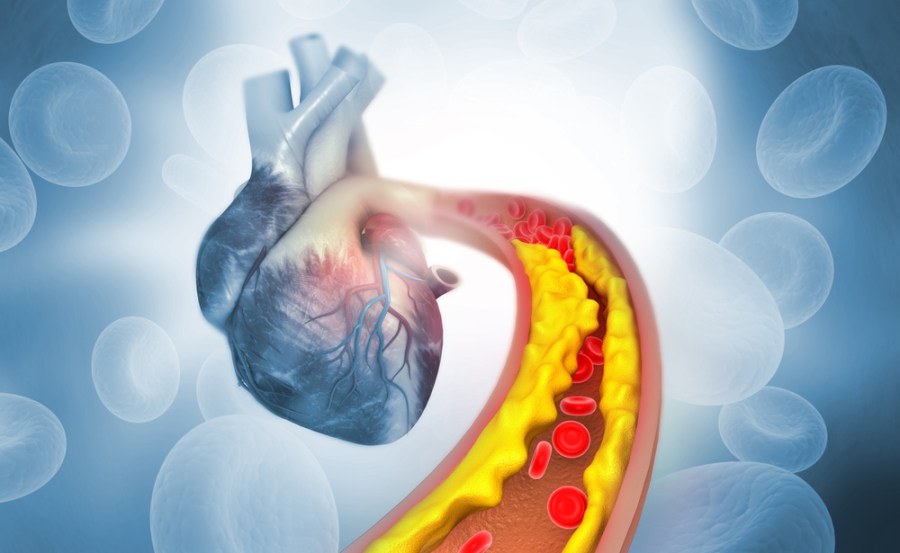There is no doubt that poor diet choices contribute dramatically to heart disease, but this may not be down to one type of food – saturated fat, says nutritionist Sarah Flower. High cholesterol has been associated with high fat diets, particularly saturated fat, but we have now begun to realise that this might not be the case. Read on…
Your liver produces 80 per cent of your cholesterol, leaving only 20 per cent from what we eat. Since we replaced saturated fats with hydrogenated vegetables oils and margarines, we have continued to see a rise in heart disease. Sugar and carbohydrates play a massive role in our heart health, as well as our expanding waistline. A diet rich in sugar, refined carbohydrates and fructose can seriously impact your health, especially your heart. Fructose is stored in the liver but is also released into the blood stream in the form of triglycerides. These can be very damaging and has been linked to heart health.
Cholesterol and inflammation
The liver also produces more cholesterol when we are stressed or suffering from ill health and inflammation. LDL particles can be large or small, and it is the small, oxidised particles that appear to be linked to inflammation and ill health. Oxidised small LDL particles are also the result of the effects of harmful free radicals – which cause damage to cells, proteins and DNA. A diet rich in antioxidants such as blueberries, pecan nuts and walnuts, however, as well one that avoids processed foods (particularly those containing trans fats), is one of the best ways to keep your heart healthy. In fact, a diet rich in carbohydrates would seem to be the cause of a higher incidence of harmful small LDL particles, coupled with an increase in triglycerides. There are other factors to consider when considering the causes of heart disease, such the role of triglycerides, the negative role of our consumption of inflammatory human-made oils, vitamin D deficiency and other factors such as lifestyle, smoking and stress, all of which can cause damage to the arterial walls increasing the likelihood of blood clots forming.
Cut back on salt
Too much salt increases risk of high blood pressure in some people because the salt can cause the body to hold onto excess fluids such as water. This can increase pressure within blood vessels and mean that the heart must work harder, therefore increasing our risk of heart disease. Our reliance on processed and junk foods high in unhealthy fats, sugars and salt, means we are adding more salt than we need. If every person were to cut 1g salt (about a quarter of a teaspoon) from our average daily intake, there would be 6000 fewer deaths from strokes or heart attacks each year. The World Health Organization recognises that salt reduction is of equal importance to giving up smoking. Read food labels and avoid processed foods, which are not only packed with salt, but also higher in sugar and bad fats. However, salt is essential, when you opt for a diet of real food, without any processed foods, you may have to add salt to your diet in order to ensure you have enough. Adults should have no more than 6g of salt per day – that’s around one teaspoon. Foods high in salt include anchovies, bacon, cheese, ham, olives, pickles, prawns, smoked meat and fish and salted and dry-roasted nuts.
Reducing your cholesterol
A recent study published in the BMJ Open Journal found that 92 per cent of elderly people with high cholesterol lived longer. The Great Cholesterol Con by Dr Kendrick makes fascinating reading with reference to many studies showing that reducing your cholesterol may in fact increase your risk of cardiovascular disease. There are other factors that cause us to have heart disease, such as looking at the role of triglycerides and what causes epidermal damage. In fact, we are now realising that cholesterol could have many health benefits, especially for women.
It is also vital to ensure you have plenty of Vitamin D, preferably from sunlight. Studies have shown that a vitamin D deficiency increases your risk of heart disease by 64 per cent and an 81 per cent higher risk of dying from heart disease. Spending just 20 minutes a day outside will also help lower blood pressure. Add a brisk walk and you will also be improving your respiratory and joint health. We get most of our Vitamin D in the spring and summer months but in the UK, we struggle to get adequate Vitamin D from the sun in autumn and winter months, so I would advise supplementation, and all year-round supplementation for elderly or those unable to get out and about. Vitamin D plays a vital role in our all-round health but is also involved in the regulation of cholesterol (along with healthy bowel flora and bile). It has also been shown to help lower blood pressure.
The health benefits of cholesterol
- Cholesterol is present in every cell membrane, helping it maintain stability and structure. It helps repair cells and tissues.
- Cholesterol aids the production of our hormones, such as oestrogen, progesterone, testosterone and cortisol. Our bodies produce up to 1g a day of cholesterol to help the synthesis of hormones.
- 60 per cent of our brain is made up of fat and cholesterol and this is an essential part of brain function.
- Cholesterol plays an important role in the digestion of fats.
- Cholesterol helps convert sunlight to vitamin D.







